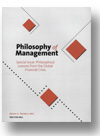
Philosophy of Management
Scope & Guideline
Elevating the Conversation on Management Philosophy
Introduction
Aims and Scopes
- Philosophical Foundations of Management:
The journal focuses on the application of various philosophical traditions—including Aristotelian, Hegelian, and Stoic philosophies—to understand and critique management practices, emphasizing the importance of ethics and moral reasoning in organizational contexts. - Exploration of Meaningful Work:
A significant area of inquiry is the concept of meaningful work and its implications for management. The journal examines how recognition, autonomy, and ethical practices contribute to a fulfilling work environment. - Critical Management Studies:
It engages with critical management studies by questioning dominant paradigms and power structures within organizations. This includes discussions on corporate governance, stakeholder theory, and the ethics of managerial practices. - Interdisciplinary Approaches:
The journal encourages interdisciplinary research that combines insights from philosophy, sociology, economics, and political theory to address complex management challenges and promote innovative solutions. - Sustainability and Ecological Management:
There is a strong emphasis on sustainability, exploring how philosophical perspectives can inform practices that align with environmental ethics and corporate social responsibility.
Trending and Emerging
- Digital Transformation and Ethics:
There is an increasing focus on the ethical implications of digital technologies in management. This includes discussions on self-consciousness in work relationships, the impact of technology on managerial practices, and the moral responsibilities of organizations in a digital age. - Resilience and Adaptability:
Emerging themes emphasize organizational resilience through philosophical lenses, particularly in relation to adapting to crises such as the COVID-19 pandemic. This reflects a growing interest in how philosophical insights can inform strategies for navigating uncertainty. - Recognition and Identity in Organizations:
The exploration of recognition and identity within organizational settings is gaining traction. Recent papers address how these concepts influence employee engagement, autonomy, and the ethical dimensions of leadership. - Philosophical Methods in Management Research:
There is a trend towards incorporating philosophical methods into management research, indicating a desire for deeper analytical frameworks that challenge conventional management practices and encourage critical thinking. - Intersections of Philosophy and Social Justice:
The journal is increasingly addressing themes related to social justice in management, examining how philosophical perspectives can inform ethical practices and promote equity within organizations.
Declining or Waning
- Traditional Management Theories:
There is a noticeable decline in papers that focus on traditional management theories without a philosophical lens. The journal seems to be moving away from conventional business management frameworks in favor of more critical and reflective approaches. - Narrow Economic Perspectives:
Topics that primarily emphasize economic efficiency or profit maximization without addressing ethical implications are less frequently explored. This suggests a waning interest in purely economic analyses of management. - Behavioral Management Approaches:
Papers focusing solely on behavioral management theories, such as those that do not incorporate philosophical critique or ethical considerations, appear to be decreasing. This reflects a broader trend towards integrating philosophical and ethical dimensions in understanding management practices.
Similar Journals

Sophia-Coleccion de Filosofia de la Educacion
Bridging Theory and Practice in Educational PhilosophySophia - Colección de Filosofía de la Educación is a distinguished academic journal published by the Salesian Polytechnic University of Ecuador, dedicated to exploring the intersections of philosophy and education. With an ISSN of 1390-3861 and an E-ISSN of 1390-8626, this Open Access journal has been freely accessible since 2009, promoting wider dissemination of ideas within the field. It proudly contributes to the academic discourse in both the Arts and Humanities and Philosophy, holding a commendable Q2 quartile ranking in both categories as of 2023. As of the current publishing period, which spans from 2019 to 2024, the journal stands out with its Scopus rankings indicating a respectable position within the 74th percentile for Philosophy and the 58th for Arts and Humanities (miscellaneous). This makes it an essential source for researchers, professionals, and students keen on deepening their understanding of philosophical approaches to education and its practical implications.

Sophia
Advancing Global Dialogue in Philosophy and Religious StudiesSophia, a prestigious journal published by Springer, is a leading platform for the advancement of knowledge in the fields of Philosophy and Religious Studies. Established in 1962, this open-access journal has embraced a global perspective and invites scholarly contributions that explore complex philosophical questions and the intricacies of religious thought. With an impact factor that reflects its significance, Sophia ranks in the top quartiles of its categories on Scopus, specifically Q2 in Philosophy and Q1 in Religious Studies, showcasing its influence and reach within the academic community. With convenient open access options available since 2009, the journal ensures that research disseminates freely, promoting engagement among researchers, professionals, and students alike. Located in the Netherlands and connected to a reputable international network, Sophia remains committed to fostering intellectual dialogue and enriching the discourse surrounding philosophical and religious issues worldwide.
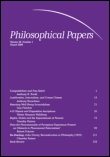
Philosophical Papers
A Premier Resource for Philosophical ExplorationPhilosophical Papers, an esteemed journal published by Routledge Journals, Taylor & Francis Ltd, stands as a pivotal resource in the field of philosophy. Having established its presence since 1972, this journal has converged a wealth of intellectual discourse and contributes to the continuous development of philosophical thought until 2024. With a prestigious Q1 category ranking in the arts and humanities, and a notable 86th percentile ranking in Scopus's philosophy category, it underscores its commitment to rigorous scholarship and influential research. Although Open Access options are not currently available, the journal remains a vital platform for philosophers, researchers, and students aiming to engage with pivotal philosophical debates and advancements. Set in the UK, Philosophical Papers exemplifies the intersection of tradition and innovation in philosophical inquiry, making it an indispensable reference for anyone dedicated to exploring the complexities of human thought and existence.
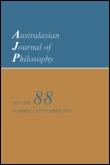
AUSTRALASIAN JOURNAL OF PHILOSOPHY
Elevating Philosophical Discourse Since 1947Australasian Journal of Philosophy, published by Routledge Journals, Taylor & Francis Ltd, serves as a premier platform for scholarly discourse in the field of Philosophy. With its origins dating back to 1947, this esteemed journal maintains a rich tradition of fostering high-quality, peer-reviewed research and is recognized for its significant contribution to the philosophy community. Holding a distinguished Q1 ranking in the field for 2023 and standing at #75 out of 806 in the Scopus Arts and Humanities ranking, it occupies a vital niche in advancing philosophical knowledge and inquiry. Although the journal is not open access, it periodically offers articles that contribute to the dissemination of philosophical thought, making it a valuable resource for researchers, professionals, and students alike. The AUSTRALASIAN JOURNAL OF PHILOSOPHY continues to inspire and challenge thinkers worldwide as it presents critical analyses, innovative ideas, and rigorous arguments, ensuring its relevance and importance in contemporary philosophical discussions.

Analisis Filosofico
Cultivating a vibrant community of philosophical inquiry.Analisis Filosofico is a leading open-access journal published by SOC ARGENTINA ANALISIS FILOSOFICO, dedicated to advancing the field of philosophy. Since its inception in 2004, the journal has provided a platform for rigorous philosophical discourse and critical analysis, contributing significantly to the development of contemporary philosophical thought, particularly in the Latin American context. With an ISSN of 0326-1301 and an E-ISSN of 1851-9636, it has consistently maintained a robust presence in academic circles, as evidenced by its rank of #349 out of 806 in the Arts and Humanities Philosophy category on Scopus. The journal currently holds a commendable Q2 status in its category quartiles for 2023 and is positioned in the 56th percentile, reflecting its quality and influence among peers. Situated in Buenos Aires, Argentina, Analisis Filosofico engages with a diverse readership, encouraging scholars, professionals, and students to explore new theoretical perspectives and contribute original research. With ongoing topics converging from 2017 to 2024, this journal not only disseminates philosophical knowledge but also fosters innovative collaborations across the global scholarly community.
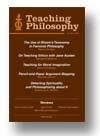
Teaching Philosophy
Transforming Educational Practices with Philosophical InsightsTeaching Philosophy is a renowned academic journal dedicated to the in-depth exploration and critical examination of philosophical dimensions in education. Published by the Philosophy Documentation Center, the journal has been a cornerstone in the field since its inception in 1977, providing a rich resource for educators, researchers, and students interested in the philosophical underpinnings of teaching and learning. With an ISSN of 0145-5788 and an E-ISSN of 2153-6619, it serves as a vital platform for disseminating research that bridges the gap between philosophy and educational practice. Although currently not an open-access journal, Teaching Philosophy maintains a significant impact within its field, reflected by its impressive quartile rankings—Q4 in Education and Q2 in Philosophy, as well as its Scopus rankings that position it within the top half percentile of both the Philosophy and Education categories. The journal aims to foster scholarly dialogue on diverse philosophical topics in pedagogy, ensuring that insights from philosophy continue to inform and enhance educational practices. Whether one is a seasoned philosopher or a budding educator, Teaching Philosophy presents an invaluable avenue for enriching understanding and engagement in the discipline.
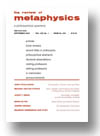
REVIEW OF METAPHYSICS
Exploring the depths of metaphysical thought since 1975.REVIEW OF METAPHYSICS is a distinguished journal published by PHILOSOPHY EDUCATION SOC, INC, dedicated to advancing scholarly discourse in the field of philosophy. With an ISSN of 0034-6632 and an E-ISSN of 2154-1302, this journal has been a crucial platform for philosophical inquiry since its inception in 1975, converging its rich content from 1992 and continuously serving the academic community up to 2022. Based in the United States, specifically at 223 Aquinas Hall, Catholic University America, Washington, DC, it has secured a reputation for quality, reflected in its placement within the Q3 category of the 2023 Philosophy rankings, and a Scopus rank of 367 out of 806 in Arts and Humanities, placing it in the 54th percentile. Although it does not offer open access options, the REVIEW OF METAPHYSICS remains an essential resource for philosophers and students alike, fostering critical perspectives on metaphysical issues, and thereby contributing significantly to the advancement of philosophical studies.

Studia Philosophica Kantiana
Exploring the Depths of Kantian ThoughtStudia Philosophica Kantiana is a premier academic journal dedicated to the exploration and analysis of Kantian philosophy, published by PRESOVSKA UNIV PRESOVE. With an ISSN of 1338-7758, the journal aims to serve as a vital resource for researchers, educators, and students interested in the nuances of Kant's philosophical contributions and their implications in contemporary thought. Although it currently does not offer an open access option, the journal seeks to publish high-quality articles that advance the understanding of Kantian principles, ethics, and epistemology. The journal includes a diverse array of content such as peer-reviewed articles, critical essays, and reviews, enriching the scholarly discourse in the field of philosophy. As it continues to grow in reputation among its peers, Studia Philosophica Kantiana is poised to make significant impacts on the study and interpretation of Kant's work in Eastern and Western philosophical contexts.

Beytulhikme-An International Journal of Philosophy
Exploring the Depths of ThoughtBeytulhikme-An International Journal of Philosophy is a distinguished publication dedicated to the exploration and dissemination of philosophical scholarship. Published by Beytulhikme Felsefe Cevresi, this journal serves as a platform for researchers, academics, and students to engage with contemporary philosophical discourses and historical inquiries. With its commitment to open access, Beytulhikme ensures that valuable philosophical insights are readily available to a global audience. The journal welcomes a diverse range of submissions, including theoretical papers, critical reviews, and interdisciplinary work that reflects the dynamic nature of philosophical research today. Located in Ankara, Turkiye, Beytulhikme plays a pivotal role in fostering a deeper understanding of philosophical concepts and methods, thus contributing to the academic community and enriching scholarly dialogue. As a key resource for professionals in the field, Beytulhikme not only encourages innovative thinking but also promotes a comprehensive examination of both Eastern and Western philosophical traditions.

Teoria-Rivista di Filosofia
Engaging Minds in Rigorous Philosophical AnalysisTeoria-Rivista di Filosofia is a distinguished academic journal published by EDIZIONI ETS, based in Pisa, Italy. With a focus on philosophical discourse, this journal is a valuable resource for researchers, professionals, and students in the field of philosophy. Having achieved a commendable Q3 ranking in the 2023 category quartiles, Teoria stands out in the competitive landscape of philosophy journals, with a Scopus rank of #612 out of 806, placing it in the 24th percentile. Although currently classified as a non-open access publication, it frequently addresses cutting-edge themes and challenges within philosophical research, promoting rigorous analysis and diverse perspectives. The journal spans various topics across multiple issues from its inception in 2011 to its ongoing publications scheduled through 2024, making it a relevant venue for contemporary philosophical inquiry. The journal aims to foster scholarly communication and stimulate critical debates, contributing significantly to the global philosophical landscape.